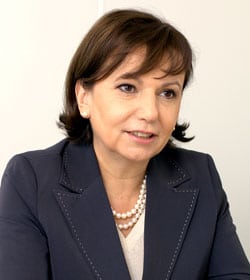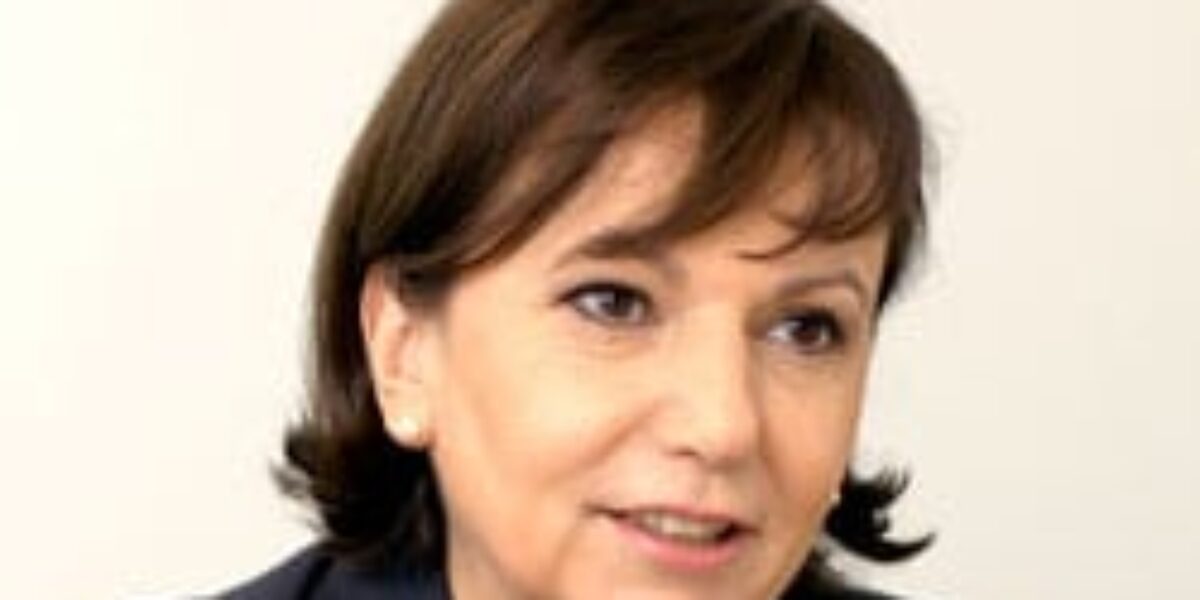Get connected – an interview with Petra Wassner

At the close of 2011, the Eurozone was hardly a place of celebration. The EU was coming apart at the seams; a failed experiment that could implode at any second. Or at least it was if your view of the world was filtered by British press headlines.
But behind the secret agendas, rancour, and sheer bloody mindedness, what is the real story? Petra Wassner is CEO of the economic development agency NRW.INVEST. Being hardwired into Germany’s most successful federal state, surely she would have a clearer view of the answer. We found out with a frank, exclusive interview…
NEE: With the Euro in turmoil and the German economy being relied upon to relieve the strain, how resilient is the nation’s economy and optimism at the moment?
Petra Wassner: The euro debt crisis means that economic experts from the German government, the EU and the OECD now expect growth of only 0.6 to 1.0 percent for Germany in 2012. The loss of confidence on the part of investors and the changed climate in the economy are said to be responsible for this. However, we should take care not to invoke a recession. In 2011, Germany has grown by around 3 percent. This year, German exports will exceed the 1 trillion euro mark for the first time. We have the lowest unemployment for 19 years and the companies are once again taking on new employees. The ifo index, one of the most important mood indicators in the German economy, just rose again in November. Consequently, top German managers are looking to 2012 with greater optimism than expected. Most business representatives are calling for German politicians to make a decisive contribution to solving the problem and to deal with the euro debt crisis.
NEE: How has it affected the economic mood in NRW specifically?
Petra Wassner: With economic output that accounts for almost a quarter of Germany’s gross domestic product, our federal state generally reflects the overall economic situation in Germany. At present, this also applies to the mood in the economy of North Rhine-Westphalia. The ifo business climate index also improved in most North Rhine-Westphalian companies in November. The state is currently posting the lowest employment for 18 years and the highest employment rate for 20 years. The manufacturing industry, the main construction trades and in particular the wholesale and retail trades are looking positively towards the future. In conversations with business representatives we are noticing on the whole that they are currently more reserved in their actions than a few months ago.
NEE: What is the outlook for your region in terms of investment in the coming year and how does it reflect with year-on-year developments?
Petra Wassner: For the year 2012 we are expecting to be able to attract about the same number of foreign investors for the region as in the previous year, however the total investment volume could decrease slightly.
For several years now we have been experiencing a steady trend with regard to foreign direct investments. This year the London-based trade journal for foreign direct investments, fdi Magazine, named North Rhine-Westphalia as the second-fastest-growing investment in Europe between 2006 and 2010, i.e. also during the pronounced crisis years 2008/2009. At present we can see two trends among international investors. On the one hand, they are more reserved about investment decisions due to the current euro crisis. On the other hand, the weak euro also offers an attractive price level for investors outside the euro area.
Is your region more resilient than others in Germany, and if so, how?
Petra Wassner: As I just mentioned, we are a very good reflection of the German economy. We are the industrial core region of Germany. So we cannot say that we are more resilient than other regions in Germany. However, our location factors have convinced many companies from Germany and abroad. We are one of the largest European marketplaces and the logistics hub of Europe. Our universities and research institutes conduct leading-edge research. With 69 universities and nearly 530,000 students the state offers highly qualified workers. So it is no wonder that there are more than 13,100 foreign firms based in North Rhine-Westphalia.
NEE: It’s estimated that NRW counts for a quarter of all foreign investment inflows into Germany, what are the current trends for investments by sector and country of origin?
Petra Wassner: For some time now in the location business, NRW.INVEST has been experiencing three fundamental trends. Firstly, there is distinct evidence of agglomeration. This means that investors are more likely to decide in favor of a particular location if companies from the same country of origin or the same sector are already based there. Secondly, logistics centers are continuing to locate here to a substantial degree. And thirdly, as a research and development location Germany is still well able to hold its own in the face of international competition. With regard to the investor countries we can see that the People’s Republic of China has been developing for years into an important investor for Europe. This applies in particular to North Rhine-Westphalia. We are now the leading location for the Chinese economy in Europe. Following locations by companies such as Huawei and Sany Heavy Industry we can assume that the investment volume and the employment market effect will increase with Chinese investments in the future. We continue to see traditional investor countries such as the USA and Japan at a high level.
NEE: What would you like to see happening in Europe to calm the current situation and encourage more investment?
Petra Wassner: Europe needs a common economic and currency policy. All the members should act to transform this crisis into a genuine opportunity. The German business community stands behind the euro and calls for solidarity from politics. However, the path taken should establish clear rules and sanctions in order to accelerate debt reduction in Europe. The solutions currently being developed by France and Germany are heading in the right direction.
NEE: Realistically, what do you predict will happen during 2012?
Petra Wassner: At the moment I am expecting the politicians to come up with a viable solution to the euro debt crisis in the first quarter of 2012. All the European member states will have to make a solidarity contribution to this end. Basically, I also expect the economy in Germany and in North Rhine-Westphalia to grow in 2012 – but at a lower level than in 2011. Germany and North Rhine-Westphalia in particular will remain an attractive location for foreign investors. In individual cases, the euro crisis could even prompt investors from outside the euro area to make larger investments in our region.


